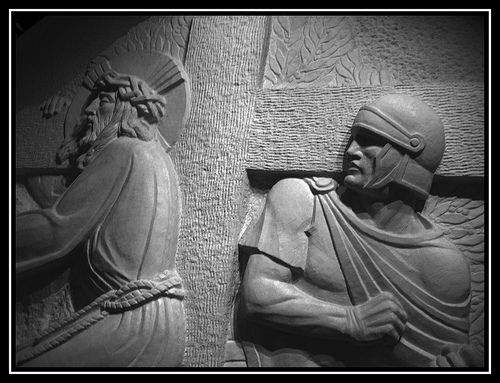We run our website the way we wished the whole internet worked: we provide high quality original content with no ads. We are funded solely by your direct support. Please consider supporting this project.

Why NO Violence in Jesus’ Name is Justified
Image by papapico via Flickr
On Friday, Greg posted a response to Obama’s speech about religiously-inspired violence. Here are some further thoughts on why violence in the name of Jesus—no matter whether we call it just, redemptive, or defending ourselves—is just another form of kingdom-of-this-world living.
The love we are called to trust and emulate is supremely manifested on the cross of Jesus. The cross is the ultimate symbol of the kingdom of God, for it defines what the kingdom always looks like. It looks like Christ—self-sacrificial and loving. It always looks like grace.
Jesus could have exercised “power over” Pilate and the Roman government to defend himself. He could have allowed his disciples to pick up swords and fight and he could have summoned legions of warrior angels. He could have “won”! Had he done so, he would have preserved his life and controlled the behavior of his foes, but he would not have transformed anyone’s heart. He would not have helped anyone love God or love themselves and others as people loved by God. The power of the sword, even if wielded by mighty warring angels, can never transform a person’s inner being. While the use of the sword tends to deepen the resolve of the punished rather than transform it, Jesus’ aim was to transform hearts and, by that means, transform the world.
So rather than fight and “win,” Jesus chose to “lose.” Or better, he chose to lose by kingdom-of-the-world standards so that he might win by kingdom-of-God standards. His trust was not in the power of the sword but in the power of radical, self-sacrificial love, and so he let himself be crucified. Three days later, God vindicated his trust in the power of sacrificial love. He had carried out God’s will and, by his sacrifice, defeated death and the forces of evil that hold this world in bondage (Col 2:13015).
This is the heart of the kingdom of God. The rule of God is established wherever God’s will is obeyed and God’s character is manifested. These are, in fact, two facets of the same reality, for God’s will is that his character, his “name,” or his glory be manifested (Jn 12:28), which is all about displaying God’s unsurpassable love (1 Jn 4:8-9).
The character of God is manifested when instead of employing violence against enemies to crush them, Jesus loves his enemies in order to redeem them. The kingdom is revealed when instead of protecting himself, Jesus allows himself to be murdered. God’s love is marvelously put on display when instead of clinging to his perfect holiness, Jesus puts himself in the place of sinners. And the nature of the rule of God shines radiantly in Jesus’ final prayer for the forgiveness of those who moments earlier mocked him, spit on him, whipped him, and crucified him (Luke 23:34).
This is simply who God is and what God is up to in the world, and so living consistent with God’s character, reflected by the cross and the teachings of Jesus, is simply what it means to submit to God’s reign. In sharp contrast to the kingdom-of-the-world thinking, therefore, disciples of Jesus aren’t to act first and foremost on the basis of what seems practical or effective at securing a good outcome. We are to act on the basis of what is faithful to the character and reign of God, trusting that, however things may appear in the short term, in the long run God will redeem the world with such acts of faithfulness.
—Adapted from The Myth of a Christian Nation, pages 33-34, 41
Category: General
Tags: Enemy Love, Myth of a Christian Nation, Non-Violence, Obama, Violence
Topics: Following Jesus
Related Reading

Can Christians serve in the military?
Question: Jesus ministered to military people (e.g. a centurion) and didn’t tell them to leave their military post. So do you think Christians can serve in the military? I believe it’s a Christians duty is to serve their country, aid the wounded, defend the oppressed, protect our families, stand for truth and justice, and kill…

A Dialogue with Derek Flood: Is the Bible Infallible?
I’m happy to see that Derek Flood has responded to my four part review of his book, Disarming Scripture. His response—and, I trust, this reply to his response—models how kingdom people can strongly disagree on issues without becoming acrimonious. And I am in full agreement with Derek that our shared conviction regarding the centrality of…

How the Church is Tempted to “Do Good”
The previous post spoke of God’s call to the church to be resident aliens: a holy, distinct people who are set apart and peculiar when compared to the patterns of the world. The holiness of God’s kingdom is cruciform love, which constitutes our distinct witness to the world. Preserving this holiness and resisting the Devil’s…

Things I liked and things that bugged me about “Noah”
I finally had a chance to go see Noah the other night and thought some might find a review helpful. Since this is a review of a movie and not a commentary on the biblical text, I’m setting aside all theological issues that surround this narrative, such as whether it was a local or global flood…

Cross-like Love and Non-Violence
Cosmo Spacely via Compfight Though it seems to have been forgotten by many today, the cross wasn’t simply something God did for us. According to the NT, it was also an example God calls us to follow. Hence, after John defined love by pointing us to Jesus’ death on the cross on our behalf, he…

Blessed are the Peacemakers
We recently watched a show on Frontline (PBS) called The Interrupters. This two hour long documentary follows several “Interrupters” as they attempt to peacefully resolve conflict in their oftentimes violent neighborhoods in Chicago. The group of Interrupters is a mix of the young and the not-so-young, women and men, single and married. They represent multiple…
